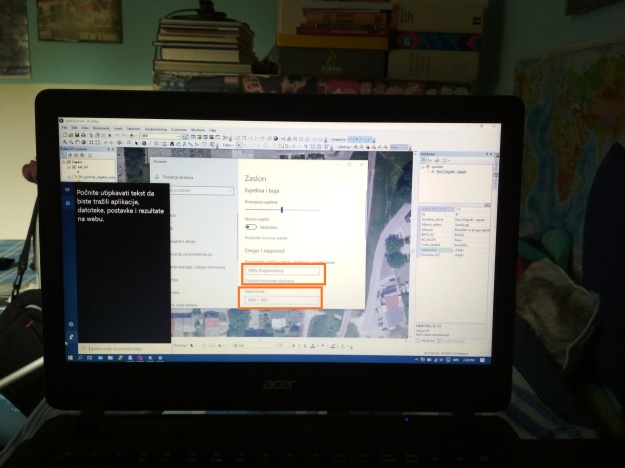A quick post now: new WordPress editor sucks as and is the biggest piece of shit I’ve seen in me life!
Category Archives: English
This is not how mature human beings behave
The other day I had an encounter with a spoiled little brat …although according to her, she was hardly a brat. Well, like a 23-year old brat ×D I would prefer to tell her this in her face, but was …unable to do it; nothing better to do here anyway, so why not blog about it a bit?
Think a little intro is required for you to get the perspective. Well, kill me; either just don’t read this paragraph or don’t read the post at all ×D Anyhow, I’ve been playing Star Wars The Old Republic for ages now. We used to have a local guild (I actually blogged [Croatian] about it like 8 years ago), but it’s been pretty-much dead for years now. I’ve been going through different guilds with different toons for the past few years, but I’ve always kept the main toon in the old guild in hopes people might start showing up again. Well, whenever I log onto that toon, there’s maybe one more person online in the guild in addition to meself and not a very talkative person at that. Anyway, a couple of weeks ago or so, I logged in to find someone online, and a talkative someone at that! Now, for the sake of argument, let’s just call that someone Alma.
I managed to talk Alma in joining my current guild (very nice people in there 🙂). One evening I even stayed up quite long to invite all her toons to the Imperial guild. Note that, anyone could have done that, but she wanted me to do it. We were planning to do a mission together for some time, but never managed to synchronize our timetables ×D Once she actually fucked me up good without touching my dick by a milimetre ×D but never mind that. Anyhow, one evening we started the so much planned mission …and, well managed to do five minutes tops, when the bitch left the mission, stopped talking to me, blocked me and soon afterwards left the guild and discord servers (hence me blogging instead of telling this to her face ×D ). So what happened? She wanted to skip everything (cinematics, dialogues and whatever). I wanted to hear the story ’cause it had been ages since I’d done the mission before, so I told her mkay, I wanna hear the story, so I’m gonna skip as soon as I read/hear what they’re saying. Well, needless to say, little Alma didn’t like that… Now, Alma before trashing your spoiled little ass, like you deserve, lemme apologize if you lied about your age and you actually are like 13 years old. I mean, your spoiled behaviour is still inexcusable, but at least it can be understood in that case. Anyhow, who the FUCK do you think you are for everything to be exactly the way you want?! Not willing to compromise one bit or at least tell me why it’s so bloody important for you to skip bloody everything… This is how spoiled brats in puberty behave; not mature people. Although we understand and tolerate such a behaviour in puberty, we nevertheless chide kids because it’s unacceptable and we certainly don’t encourage such a behaviour. You told me you’d left a guild because of an argument. Well, if you behaved like that, no wonder. At least, you had sense enough to leave us before we kicked you for spoiled behaviour. Of course, it’s possible you hadn’t had the sense with the previous guild and they actually kicked you. In which case, you kinda learned a lesson; but a better lesson to learn would be to change your bloody behaviour rather than fleeing guilds before you show your true colours.
Oh, I’ve been kidding with a guildy how women can be bitchy during PMS. Before, you conclude that’s just some geeky macho talk, the guildy in question is a woman ×D Anyhow, nope, PMS ain’t an accuse. I’m frequently in pain and I don’t jump around at people. If I feel moody, cranky or whatever, I avoid contact. I certainly don’t agree to do something with someone, only to jump at them and vent all my frustrations at them… Well, at the very least, if you do such a thing, you can say you’re sorry afterwards, you were just pissed at the world and overreacted; you know something that tends to work best when you don’t brake all the contact whatsoever…
A little digression: Alma and I did one mission together before the planned mission. A weird guy – to say the least – did that one with us and Alma immediately said she wouldn’t do any more mission with him which is her prerogative and, well, I mean the guy wouldn’t even revive his fallen comrades! Anyhow, just before going all haywire, Alma told me that I was “worse” than that guy. Well, Alma, the guy in question might be weird and if you ask me he does behave a bit childishly, but not like a spoiled brat. So I may be “worse” than him, but we’re both better than you, which makes you…,
Well, that’s it,
Take care, cheers and skål!
Posted on 23rd August, 2020 at 09:19 GMT
Use Time Zone Converter to quickly convert the time
SERBO🇷🇸CROATIAN🇭🇷 + 🇧🇦
I’m sick and tired of foreigners and even natives debating on whether Bosnian, Croatian and Serbian are the same language and how different they are; that there are fewer differences between them than between American, Australian, British and whatever English.
In short: they are different, but very similar lingoes; definitely more different than different varieties of English. Anyone who says differently (considering English and Serbocroatian comparison, that is), either doesn’t speak English or Serbocroatian; take your pick 🙂
You can look at Serbocroatian as a macrolanguage with three standards (Bosnian, Croatian and Serbian) and a bunch of dialects.
Now, a bit of further elaboration 🙂
First, you must distinguish a dialect from a standard language. I’m saying this because I’m sick of people – especially natives who think Bosnian, Croatian and Serbian are one and the same – saying the three are dialects of the same lingo when they are most certainly referring to standards. I mean, people who don’t know even such a basic distinction actually presume to tell anybody what certain languages are and aren’t! How self-absorbed can you get?! Dialects of a certain lingo can very so much that there is virtually no mutual ineligibility between a speaker of a certain dialect and a speaker of another even though the language in question is the same. That would be why (most) lingoes have a standard language or, in cases like Serbocroation, more than one. I would call the various standards of English just variations because, accents aside, standard English in the US, UK, Straya etc. doesn’t differ that much (spelling differences are minimal and neither are reflected to pronunciation nor to accent). The point is that a Yank would read a text the same regardless of the standard or spelling employed and it would take you a rather long time to identify where the text came from; eventually you might realize, but only if vocabulary and/or phrases of a certain region were frequently used. Same goes for Aussies and Brits. For example, how would you, as a native speaker, say color? How would you say colour? When I read a Serbian text, on the other hand, the person listening to me realizes I’m reading Serbian rather quickly.
Serbocroatian is a shining example of standard languages and dialects. So, there are three standards – Bosnian, Croatian and Serbian – which are very similar and totally mutually intelligible, and loads of dialects which often ain’t that similar; they can differ so much that there can be barely any – if any at all – mutual intelligibility even in the same country (namely in Croatia). The most important matter to point out here is that dialects do not follow (political) borders and when people identify their lingo, they usually identify it with their ethnicity. That’s why a Bosniak in Sarajevo‘s going to say he speaks Bosnian, a Croatian that he speaks Croatian and a Serb that he speaks Serbian even though everybody in Sarajevo speaks the same (although people might use Croatisms or Serbisms more often in their speech to emphasize they’re either Croatian or Serbian). Basically, spoken language takes structure and vocabulary from an area where people (that is, speakers) live despite how they call the language they speak. That’s why, people in areas such as the aforementioned Sarajevo (Bosnian capital), usually just call their lingo “our language”.
Moreover, a Croatian from northern Croatia and a Croatian from Dalmatia, don’t understand a word of their spoken lingo despite they both claim to be speaking Croatian (as I said, this is why standardized languages exist 😉). A little extension: a Croatian and a Slovene around the border speak the same yet the Croatian says he speaks Croatian (and turns to standard Croatian when he needs to) and the Slovene says he speaks Slovenian (and turns to standard Slovenian when he needs to). Standard Croatian and Standard Slovenian ain’t mutually intelligible, so the two guys wouldn’t understand each other if they were speaking standard lingoes (without additional language learning that is 😉). But while the mentioned Northener and Dalmatian don’t understand each other’s dialects, they use the same standard lingo to communicate.
In terms of English, the UK has a lot of dialects. As I’m but a humble foreign speaker and, therefore, not a Brit, I can’t really say how big those differences are and ask British readers to confirm the claim 🙂 I know, though, that I understand shit when a Londoner speaks his slang and when a Glasgower speaks his, and I’m pretty sure the two would understand shit of what each is saying (mkay, probably more than me since they are English speakers, but still…)
All in all, dialects and standard languages are a different matter. Savvy? 🏴☠️
So while standard Bosnian, standard Croatian and standard Serbian are mutually intelligible (because all Serbocroatian standards are based on the East Hercegovian dialect, but were developed in two main cultural centres which were separated by a country border at the time), dialects can differ a lot and mutual intelligibility is not the only criterion to distinguish lingoes. Would you say that Hindi and Urdu are the same? Bulgarian and Macedonian? Indonesian and Malaysian? Danish, Norwegian and Swedish? Those are just examples I can think of.
Moreover, although we – Bosniaks, Croatians and Serbs (and Montenegriners) – all understand each other perfectly, the structure of Standard Croatian and Standard Serbian can differ a lot; aye more than American 🇺🇸 Australian 🇦🇺 British 🇬🇧 Also note that the differences between various English standards can mostly be attributed to the lingo being spoken natively around the globe, (Tell me again. What’s the distance between the US and the UK? UK and Straya? US and Straya?) Serbocroatian, on the other hand, is spoken in a rather small compact area (namely Bosnia, Croatia, Serbia and Montenegro). Just check out the map below: 😉
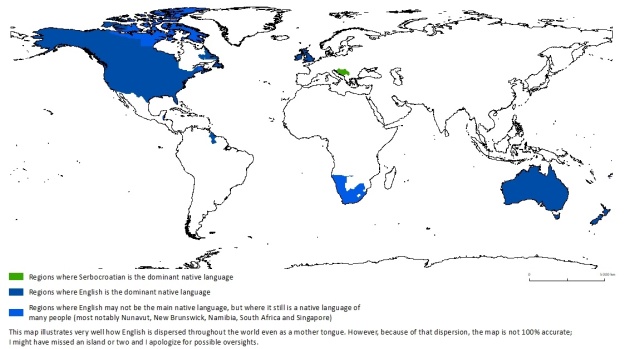
Before Montenegriners 🇲🇪 start jumping at me for not mentioning them earlier, I didn’t do it because Montenegrin is undergoing standardization process and because most ethnic Montenegriners say they speak Serbian anyway. I guess it can be compared to how many Scots speakers say they speak English 🤷🏻
Finally, the term Serbocroatian. As I said, you can look at Serbocroatian as a macrolanguage with three standards and a bunch of dialects. Therefore, it’s logical to use the term when you’re referring to something relevant for every standard or when you simply can’t distinguish which one you’re talking about (just keep in mind there is a difference 😉) which is not at all unusual for foreigners. Now, the term had been stigmatized in Yugoslavia because it was used for the name of an official language of the Federation (and many republics within as well). Furthermore, Yugoslav authorities tried to eliminate the uniquenesses of each standard as much as possible so that we would indeed end with one standard language. Of course, it’s not language’s fault people are assholes, so I have nothing against the term and use it frequently when referring to the aforementioned (but I must warn you that you might wanna avoid the term in front of natives because people are assholes and someone actually might take offence 🤔). Well, I use the term in English at least. Like I said before, natives – including me – usually say “our language” to refer to Bosnian, Croatian and Serbian collectively, which is deemed “politically correct”… 😕 Well, I could hardly say that to someone who doesn’t know what bloody language is “mine”, right?
Since the end of the war, an abbreviation BCS (for Bosnian, Croatian, Serbian) (the one I used in the address of this 👆🏻 post 👆🏻 😉) has been used more and more and since it’s short, why not?
Hmm… 🤔 maybe I should finish the post by saying that I speak Croatian and understand Bosnian and Serbian 😉 I mean, if I were to take a Serbian grammar test, I know I would flunk; mkay, maybe I would pass in the end, but I’d score poorly 😀 Savvy? 🏴☠️
That’s it. Hope I shed some light on the matter 🙂
Posted on 18th August, 2020 at 17:37 GMT
Use Time Zone Converter to quickly convert the time
No more Emojipedia and character map (and/or typing Unicodes)!
Good moaning folks!
Been ages since I blogged last, but well… life and shit happens 😕
Anyhow, recently I found out keyboard shortcuts to access emojis and symbols anytime, anywhere in Windows. Quite simple actually and I can’t believe I didn’t hear of it before! Lifesaving if you ask me because, in addition of being able to enter shiny emojis everywhere where they are supported (actually a lot more common than it seems on the first glance…), you can enter any character you would ever need without the character map or typing Unicodes (although you might find typing Unicodes quicker depending on your needs). If you wanna write about, dunno, El Niño and want to spell the phenomenon properly, but don’t have access to Ñ, these shortcuts can come in quite handy. Although, if you want quick access to Ñ and loads of more characters, I suggest you add US International keyboard layout in addition to your local layout and if your default layout is the basic US layout (which is the case in all Anglophone countries except the UK and Ireland 🙂), you might consider making US International default because because the US International layout is the same as the basic US layout with additional characters being accessed with AltGr (right Alt) key.
You might also want to try to customize your own layout with MS Keyboard Layout Creator (a free 🙂 program for Windows) to make it more functional like me.
But those are different stories 😀
Now, I should thank Mosh Hamedani for this “discovery” because it was his YouTube Python course that made me Google this shit out 😀 So, thanks Mosh! 😀
Anyhow, the keyboard shortcuts on American QWERTY keyboard layout are Win Key + “.” and Win Key + “;” (without the quotes, of course 🙂). As for other layouts, try pressing keys located where “.” and “;” are located on the American keyboard (in my case those are “.” and Č).
Now, once you press either of those combinations, you get a popup with emojis! 😀

Click on the image to enlarge it
To gain access to symbols, just click on the little Ω after clicking Win + “.”.

Click on the image to enlarge it
Now, the reason I had to Google my ass of is because the shortcuts didn’t work for me at first! They started working after I accessed emojis on touch keyboard first. So to enable touch keyboard, right-click on the taskbar and checkmark Show touch keyboard button (I watched this tutorial). Once touch keyboard is enabled, a small keyboard icon is gonna appear left of the language code left of the clock. Click on it and click on the emoji icon to enter an emoji once the keyboard pops up

Click on the image to enlarge it
You can just disable the touch keyboard afterwards if you want. Although, touch keyboard can be quite shiny, especially if you use other layout(s) in addition to your local layout (e.g. I have Greek, Serbian Cyrillic and US International in addition to Croatian) because you can see how the keys on those layouts are mapped, so you might consider keeping the touch keyboard 😉
That’s it, if you still have trouble with emoji/symbols shortcut, try switching to the American layout and this “guide” applies only to Windows I don’t know if this works on Linux; probably depends on a distro 😉
Well, cheers!
Update 15th June
A small wee little update. With all the work I’m taking Mosh’s course slowly. Anyhow, the guy just said he hated cats and the motherfucker was LAUGHING! Well, Mosh, you are a fucking asshole and now I hate you! Was thinking of buying your advanced course after I finish this one, but now – if I’ll go for advanced at all – I’m either buy another advanced course or steal yours! And just after being smart he “encouraged” me to “get ‘his complete Python course'”. Well Mosh; I might indeed “get” it, but you won’t get a penny from me! Who the fuck do you think you are spreading such hatred?! It’s my time for (evil) laugh MWHAHAHA ×D
I mean, this morning before work me kitty spilled me juice all over the table and floor, so I had to waste precious morning time cleaning the mess (being half asleep, I doubt I did a pretty good job anyway 😕) and I ended up going to work thirsty! I’m going to kill the little punk for it when I return home 😡 but that was an isolated incident!
Posted on 28th April, 2020 at 18:54 GMT
Use Time Zone Converter to quickly convert the time
Optimal resolution for a 14″ screen
Do you have a 14″ laptop? These days, they make full HD 14″ screens, but full HD ain’t optimal for a desktop environment: text is often too tiny. True, you can scale the text, but that can look terrible depending on the program whose text is being scaled. Took me a year (and a half), but I finally realized, I should just divide 1920 with 1080 (1920×1080 is full HD) and then divide lower resolutions Windows supports until I reach the same result …and I found it 😀 The resolution is 1600×900. Everything looks nice and smooth, the text – in normal font size – is readable and no need for scaling 😀
Just don’t forget to set the resolution back to 1920×1080 when you connect your computer with a telly 😉
Cheers!
Good morning, Europe!
Europe, I wish you a good winter morning!
The morning was pretty dark, ah? After all, tonight was the longest night in the year.
Now, all you permanent DST (summer time) proponents; how dark would the morning be if we were observing summer time now?
I have a question for you: Why the fuck should we suffer dark(er) winter mornings because it’s too hard for you lazy assholes to move clocks back for a single bloody hour in autumn?!
European Commission’s proposal on time changes
Today may be the last fall back in a part of Europe and, to be honest, I am a bit dazed because of the time change and a bit tired from changing all clocks, but what are time changes? They are a smart way of managing daylight throughout the year and definitely worth being dazed a little twice a year. It’s logical that we want daylight in winter mornings, for which standard (“winter”) time is pretty-much ideal (definitely better than summer time). If we were on summer time in winter, we’d have dark and depressing mornings.
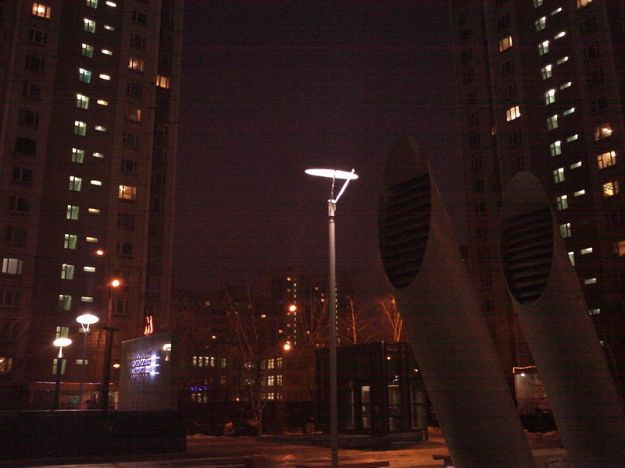
This is a photo of a December morning (9 AM) in Moscow when they were observing summer time in winter. Not much to see? Yeah, that’d be because it’s pit black… Lovely, right? This is what awaits Europe if we switch to permanent summer time.
Anyhow, despite what time changes really are about and their usefulness, most people are just praising the Commission’s “decision” to abolish time changes. I thought it right to tell you more about the “decision”. The “decision” is not a decision at all, but a P R O P O S A L – nothing more, nothing less – despite how the media might put it.
Could someone tell me why daylight should wake us early in summer? Why have daylight when everyone’s sleeping and darkness when people are active; especially outdoors when we can just move our clocks one hour forward? Indeed, a single hour makes a real difference to most of us although that depends on the location (i.e. latitude).
And what does it cost us? Changing our clocks for a meagre hour two times a year. Now, I call that a bargain.
As simple as that – little sunlight in winter, extra sunlight in summer which we can arrange better by moving an hour forward ahead and all we need to do then is go back an hour in autumn, so we’re ready for winter again 🙂 I just cannot believe people can’t grasp that!
However, abolishing time changes is no longer the issue; European Commission’s proposal – allowing every member to choose whether to observe permanent “winter” or permanent summer time – is stupid and dangerous. If time changes are to be abolished, the whole continent should either observe permanent “winter” or permanent summer time. The proposal could easily result in chaos with every other country observing different time wich would be very bad for tourism, economy, communication, business, transport pleasure etc. I can’t believe someone had come up with something that stupid in one of their sessions; let alone that the Commission’s actually endorsing it!
Now, the basis of the proposal is a failure of a poll with the turnout of less than one percent. I elaborated why the poll is a failure further in the text I pasted bellow. Although, I’ve seen critical articles to the proposal lately, at the beginning – as soon as the results of the poll had been made public, and especially after the Commission had come with their proposal; that is – most media had been praising the “decision” – how we’re saved from changing our clocks twice a year… – and saying everything had been decided without saying what consequences such a “decision” could easily bring us. There’d been a few exceptions like this article and this one though even they lean towards favouring the abolishment of time changes a bit, but never mind.
Therefore, I bombarded the institutions of the EU with inquires about the proposal. I, also, sent a text accompanied by maps to a bunch of media. A local newspaper used the text for an article they published. You can read it here (Croatian).
Anyhow, I’m just going to paste the text and maps (unlike in the article in Novi list, you can enlarge the maps here; that is make the text readable) I sent the media here:
Dear All,
I have read many articles regarding the abolishment of time changes in the EU. Unfortunately, most either just state the time changes are going to be abolished or are content in saying we will no longer have to move our clocks.
We have been temporally harmonized and co-ordinated for twenty two years.
However, European Commission’s proposal on the time changes could easily put an end to such a situation. You can read it here. It is interesting to note that the proposal is still available only in English and French, despite being made on 12 September .
The proposal says every member should choose whether they want to observe permanent DST (summer time) or permanent standard (“winter”) time, which could result in illogical and absurd time zones on the continent. Instead of having to change our clocks twice a year on the whole continent, we could end up having to change them at every other border crossing throughout the year. When we meet a business partner or a friend from another European country or simply have family there or go to a holiday, we would to have to check the time zone because time zones would not follow any logic.
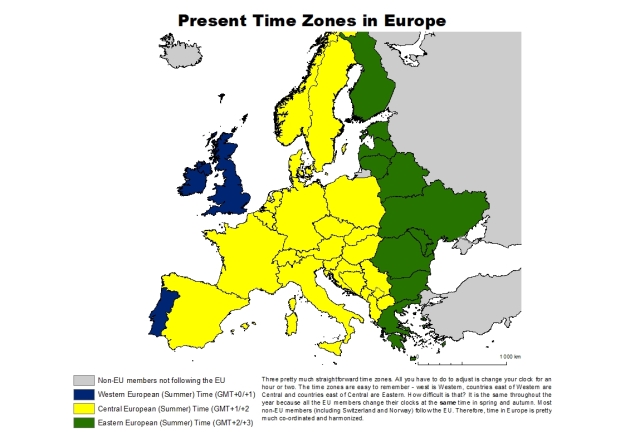 Click on the image to enlarge it
Click on the image to enlarge it
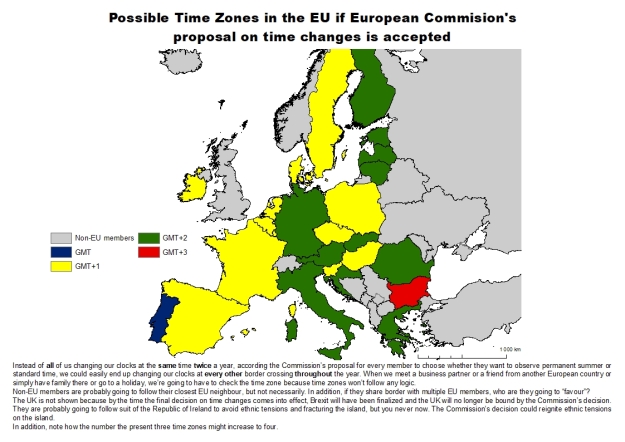 Click on the image to enlarge it.
Click on the image to enlarge it.
Such a situation could ignite or reignite ethnic tensions.
Non-EU members are probably, but not necessarily, going to follow the closest EU neighbour. Imagine if Croatia opts for standard time (GMT+1 in Croatia’s case), as do Romania and Bulgaria (GMT+2 in their case), but Hungary opts for summer time (GMT+2 in their case – same as standard time in Romania and Bulgaria). Who is Serbia to follow in such a case? Whatever Serbia opts for, Serbian Republic in Bosnia is going to follow suit to be aligned with Serbia. Bosniaks are, probably reluctantly, going to back the Serbian Republic to avoid fragmenting the country. In that case, Croats are not going to be happy to have one hour difference with Croatia. Even if Bosnia unnecessarily ends up in two time zones, well… Just take a look at the inter-entity boundary line to see how that would look like. Even worse, although very unlikely, situation is that Bosnian cantons with Croatian majority would align their clocks with Croatia while the rest of the country would align them with Serbia. Imagine the “friendly arguments” while deciding what time Bosnia should observe if Croatia and Serbia wouldn’t follow the same time.
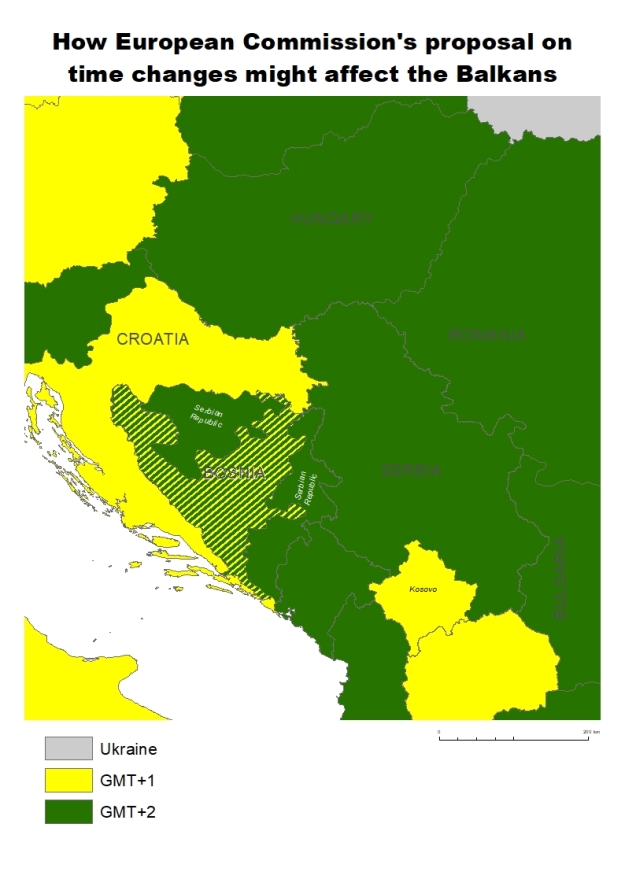
Click on the image to enlarge it.
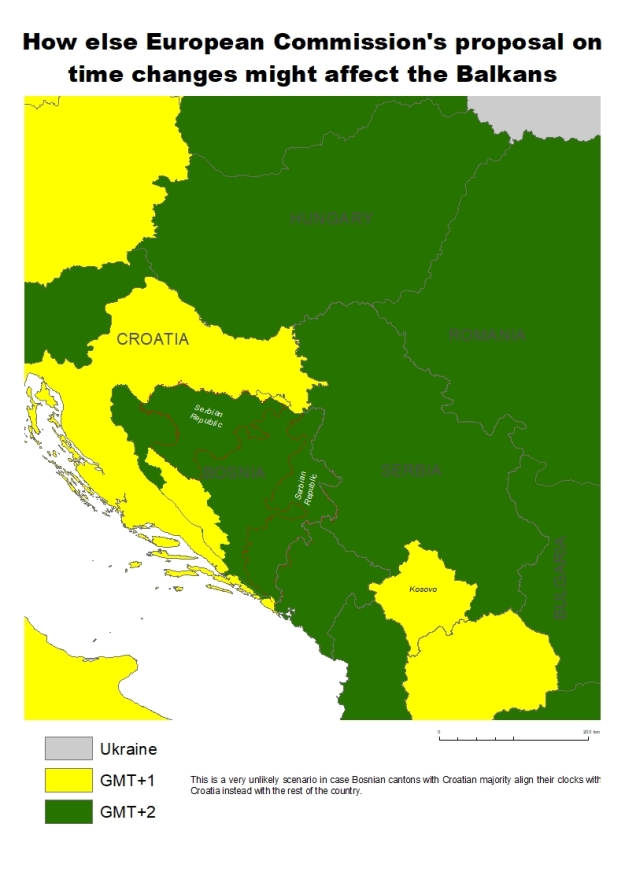 Click on the image to enlarge it.
Click on the image to enlarge it.
Then there’s Kosovo, which will probably opt for different time than Serbia just to spite them. Kosovo Serbs would be even more unhappy with such a situation than the afore mentioned Bosnian Croats.
The Balkans are not the only focal point. By the time the final decision takes affect, Brexit will have been finalized. Despite the UK no longer being obliged to follow EU directives, they are probably going to follow suit of the Republic of Ireland to avoid fragmenting Ireland. However, maybe they aren’t. Imagine how ethnic tensions in Ireland are going to rise with Northern Ireland and the Republic not aligned.
What I find really sad is that the basis of the proposal is a poll with a turnout of less than 1%. The Commission might call the poll “the Commission public consultation with ‘highest number of responses ever received'”, but the fact remains that the EU is not Croatia nor is it Luxembourg, nor any other small EU country. The EU has 28 members with the population of over five hundred and twelve million; making 4.6 million respondents a meagre number. You can look at the results here and see how poor the turnout really was. Most countries “are represented” with a lot of zeros; Germany (almost 4!) and Austria (almost 3!) being exceptions; meaning most of the respondents are from those countries, meaning other countries are not represented well; not to mention the rest of Europe that is going to be affected by the final decision. In addition, no campaign had been done prior to the poll (telling people that they can vote on an unbinding poll is not a campaign) and the poll with daylight being the main issue was held in the middle of summer when days are long! All in all, an insult to democracy; nothing more 😦
Macedonia is holding a referendum on the change of the country’s name on the 30th [September].* The turnout for the referendum to be valid must be 50% of the eligible voters + 1. How could they ever hope to join the EU with that attitude?! A poll, with a turnout of less than 1% is good enough for us…
Europe is facing many challenges and problems, but at least we have co-ordinated and harmonized time. Why make another unnecessary problem?
Best regards
P.S. I’m the author of the attached maps. Feel free to publish them.
To sum it all up, I’m going to quote a popular Croatian politician from the first half of the 20th century – Ne srljajte kao guske u maglu. Wikipedia translates it as Don’t rush like drunken geese into fog; basically, think before you act 🙂
*In the meantime, the referendum in Macedonia was held and the turnout was less than the required 50% + 1 vote (i.e. it was 35%), but Macedonian prime minister is still pushing it forth; either because he sees the European Commission is pushing forth their crap and his referendum had like a 35 times bigger turnout …or because of the fact that Macedonia is never going to get a better deal from Greece and the deal is the best compromise. And speaking of a compromise; time changes in Europe are just that – a compromise. We go an hour ahead in spring so southern Europe has later sunsets during the tourism period and then we go back an hour, so it dawns before noon in northern Europe in winter.
Anyhow, the Macedonia naming dispute is another (long) story 🙂 If you’re interested though, you can start reading about the dispute here and Google your way around for more 😉
Posted on 28th October 2018 at 10:19 GMT; 11:19 Central European Time or 12:19 Central European Summer Time if you prefer ×D
Use Time Zone Converter to quickly convert the time
Standardization
Did you know there are more than 5000 languages in the world? The number of cultures is even higher.
In all that diversity we need some common ground in modern world. Imagine if every nation used different time units (i.e. something other than days, hours, minutes, seconds). We’d have quite a mess on our hands. How would we keep track of time? What would be days in dunno Germany, could be weeks in dunno Australia. Mkay, there are different calendars, but Gragorian calendar is used world-wide as an international calendar, so while some have two New Years in a single year (e.g. Orthodox and Chinese), we all enter a new year on January 1st at the same time. Well, with 24ish hour differences because of time zones, but we need those to use daylight properly on different parts of the planet and even in this case we have Co-ordinated Universal Time [UTC, GMT, Z(ulu) Time etc.]; we can just use GMT offset to standardize our local time (e.g. GMT-5, GMT+2…) although, truth be told, many people don’t know the GMT offset of where they live and even more don’t comprehend daylight saving time 😦 But that’s a different story.
For better or worse, out of the thousands of lingoes, we use English as de facto lingua franca. To be honest, it’s probably for the better because if you think English grammar is a bitch, you should take a sniff of other lingoes 😉
There are even Ocean Data Standards and there’s International Organization for Standardization (ISO).
But now, we come to thingies we don’t have standardized. There are many, but I’ll name a few.
To begin with, I would like to point out that I fully support localisms. Actually, they make us so diverse and rich 🙂 However, international standards should be taught at schools across the planet and standards should be used on shit foreigners can easily come in contact with. So, while you can say the distance between Glasgow and Edinburgh is 45 mi and that London is miles away from Glasgow, traffic signs should say the distance between Glasgow and Edinburgh is 75 bloody kilometres and between Glasgow and London 650 bloody kilometres.
Yeah, there’s metric system; a measurement system adopted by all countries… expect for the US and Liberia. There are about 200 countries in the world (the exact number depends on what you consider a country); many of which have autonomous regions often with their own cultural identity. Now, imagine if all those used only local measures… So, to avoid all the mess, we all adopted a single system (a system where units and subunits are simply divided by 10, making metric system the simplest measurement system; easily mastered along with a local system), but there are always those who ain’t willing to adapt one bit. Tell me again, what number do I divide units with to get subunits in the imperial system? Is it the same number with all of them? Basically, dear Yanks, be happy we learn your lingo. Is it so hard to adapt one bit? Well, truth be told, Americans ain’t the only ones having an issue with metric system. I’ve heard those smartasses from UKIP want to abolish the metric system in the UK. Assholes, nobody expects you to abolish the imperial system. You can have it alongside the metric. It has worked out splendid like that in the UK for half a century now, hasn’t it? Not only are you making lives of foreigners visiting your country easier – thus actually boosting your tourism… – you’re helping fellow Brits to communicate with the outside world. Or are you hoping to keep your nation in the dark that way? I don’t know what’s more pathetic – keeping your own people in the dark or doing it with a measurement system. It’s interesting how these ultra nationalists work – claiming they’re all for the people all the while working against them. Bloody, hypocritical bastards… Well, I’m going off-topic here. Sorry 😦
Anyhow, since I mentioned mileage on traffic signs, I might as well continue with traffic signs. There are drivers all over the world; many of them travel abroad. Wouldn’t it be easier to have the same traffic signs all over the world? Again, while most countries and territories use the same traffic signs there are always ARRÊTs (STOP signs in Québec), ALTOs (STOP signs in Spanish speaking Central America), PAREs (STOP signs in South America) and DURs (STOP signs in Turkey). Here‘s the complete list 😉 Aye, we’re way less unified with traffic signs than we are with measure. And stop is probably the most complex word on traffic signs. Goddamn, that’s a toughy! Stop is such a rare word! It certainly doesn’t appear in Spanish and French… Well, at least you don’t need a calculator to convert PARE or whatever to STOP; better than carrying a calculator with you for speed limits 😉 Although, I guess there’s no fine for using a calculator while driving …as long as it’s not on a cellphone 🙂
Say you’re on vacation in Spain and you want to email someone. You use a local computer and want to copy a word. You wanna use a keyboard shortcut only to see Ctrl is missing! Yeah, most keyboard layouts have English labels despite characters being arranged differently to accommodate the local lingo. So, while characters are different on my keyboard from, dunno, those on a Finnish keyboard, Ctrl is still Ctrl, Alt is still Alt, Ins is still Ins etc. Therefore, after getting used to them a little, I can easily use Finnish keyboards and Finns can easily use Croatian keyboards. But, some regions decided to translate the labels… And don’t tell me the key arrangement is all that matters (“if you know the arrangement of keys, you can work on any keyboard”). First, the point is to make it as simple as possible. I mean the shape of ARRÊTs and STOPs is the same, so you should recognize the sign by its shape, but that’s not the point! The key word here is “should“. I mean, I know a guy who barely mastered Ctrl. Give him, dunno, Strg (German) and his head is going to explode! And that works with what? Ctrl, Alt, Shift and Caps Lock? God knows how other keys are arranged on compact keyboards! I could probably get my way around German labels, but others… especially French! As if AZERTY wasn’t bad enough, I’d have to watch out for Maj, Suppr and whatever… Actually, my experience is opposite. Back in the days of Internet cafés, a few French tourists entered the café I was in and upon seeing keyboards around them, they started screaming something like Clavier! Clavier! ×D
Proves my UKIP point. Assholes “want to change every little thing in their image to save the ‘dignity of their nation'” and end up unnecessarily complicating their people’s lives… I mean, French wouldn’t have died if they’d left English labels. Despite, the lingo still being a major language in the world; a lingua franca in many countries; there wouldn’t be like more than 5000 lingoes, but only three the keyboard layouts are translated to and English (maybe more, but I only know about German, French and Spanish labels in addition to English). Actually, French wouldn’t be the second most spoken lingo of Switzerland – the only lingo in Switzerland that comes close to German – in that case because labels on Swiss keyboards are in English ×D Just like, the metric system doesn’t threaten neither English nor the imperial system in the UK. Well, maybe it does threaten the measurement system because metric is simpler than imperial and is international, so if people get tired of two measurement systems (a big “if”), the imperial is likely to go. After all, we all had our own systems before the metric and they still live in certain phrases. Knowing how many phrases English has with miles, inches and pounds; the imperial systems is miles away from death in the UK and other anglophone regions 😉
Back to the keyboard layouts. Unfortunately, translating labels on keyboards doesn’t seem to be a practice from the past. I’ve heard rumours of a new Slovenian layout. Granted, Slovenes use the same layout we do. The layout was designed back in Yugoslavia, but the idiot designer(s) didn’t have Slovenian in mind, so instead of putting the letters we share with Slovenes together followed by the letters Slovenes don’t use, they put one Slovenes don’t use in the middle (i.e. instead of ČŽĆ arrangement, the arrangement is ČĆŽ). This arrangement increases the frequency of typos while writing Slovenian because you have to jump over Ć every now and then. Therefore, I understand Slovenes wanting to rearrange letters on their keyboards, but translating labels… Note that unlike Spanish, French and German that are spoken by up to hundreds of millions of people and understood (to a degree) by many more, Slovenian is spoken only in Slovenia with the population of about two million people…
Posted on 8th August 2018 at 13:25 GMT
Use Time Zone Converter to quickly convert the time
The Fionavar Tapestry
The Fionavar Tapestry is a fantasy trilogy by a Canadian author that prompted me into writing the previous post. I started reading it because the author helped Christopher Tolkien with the Silmarilion, so I thought his works gotta be good. In addition, The Fionavar Tapestry actually won some awards. Yeah, about that…
I also read that Kay (the author) has good knowledge of myths and legends and he demonstrated that knowledge in the Tapestry. Well, that much is true, but that’s about it. All in all, I can honestly say that Fionavar Tapestry is one of the worst works of fiction I’ve ever read.
So the story begins with five University of Toronto students crossing to a fictional world of Fionavar. I have nothing against the concept, but why they crossed – the pretence – is so bloody idiotic. So a mage came to “pick them up” for a party – a celebration of king’s 50th coronation anniversary – and none of them was a bit skeptic. Actually, one was a tiny bit skeptic, but he was quickly turned around. Mkay, a stranger claims he’s from another world and that he came to invite you to a party, and you accept everything he says, welcome him with open arms and go with him with no questions asked… Yeah… And here I can’t understand why people drawl over a royal bloody wedding…
I should have probably stopped reading right there, but I kept going naively hoping against hope things would become better because an author who helped Christopher bloody Tolkien just can’t write something this stupid. Like experience hasn’t taught me times and times again that something can be good or bad whether it’s written or played by a good or bad author/director/actor. The prime example is probably I Am Legend. Will Smith is a great author yet I Am Legend is among the most senseless movies ever.
So what happened when the students crossed over to Fionavar? They quickly became the most important people in Fionavar, of course and everyone in Fionavar was A-okay with that. Mkay… so you’ve been busting your ass for decades with something and suddenly a brat from another world – who came to your world like a day ago – is bossing you around and giving you lessons. Would you accept it so willingly? Wouldn’t you be at least a tiny bit annoyed? Could you say that everyone around you wouldn’t have a problem with such a behaviour of the brat from another world?
But, the students did lack some skills. A law student, the University’s MVP basketball player, lacked the skills to wield a sword, so the poor soul had to go for a battle axe… Minutes after appearing on Fionavar he slew a big monster. One would say that he was at least a lumberjack… alas no, he was a bloody law student; a basketball player. Basically, the 5 main characters are just a bunch of Reys.
In book two, a guy saved the day by fucking a hag… And the ending of the trilogy?! So the bad guy’s son came to his immortal daddy and the daddy told him that if his son had been killed anywhere else but there, he’d become mortal, but now Daddy could kill his boy right there because if he dies in Daddy’s presence, Daddy’s immortality is insured. And what did the son do? He killed himself to insure his evil daddy’s death… Where is the bloody sense???
Don’t get me wrong, I’m not saying The Fionavar Tapestry doesn’t deserve to be awarded. It really takes talent to write something that stupid. You really need to be something… And, aye, you have to be an even bigger something to continue reading the crap after being disappointed time and time again which, sadly, doesn’t go in my favour.
I might give Kay’s other works – like Tigana – a shot, but not for quite some time. After all, like I said, one crap doesn’t necessarily mean an author’s entire bibliography’s a shit, but the Tapestry… Just stay away from it! You have been warned… 😊
Canadian spelling
- Content
Use Ctrl+F codes to quickly navigate through the rest of the post:
Short intro (cf1)
Question(s) of the day (cf2)
Short intro (cf1)
I’d say that English is a good lingua franca because the lingo is relatively simple. That is as simple as languages go. Just ask polyglots. Lingoes like Finnish and Polish are nightmares for foreigners.
The only thing that makes no sense is spelling. But to any opposition to a spelling that has no sense, there are merits to such a spelling though. English employs simple 26 letters easily accommodated on a keyboard, so writing the language properly is no problem on any keyboard, at least when it comes to Latin script and Latin script is the most widely used script. True, in large part that is because of English, but the script is natively used in most European languages and has been adopted in many others.
Another advantage English is the language is native in countries around the world, but it has a pretty much unique spelling system (Commonwealth and American differences are minor), meaning English speakers can easily read American, Canadian, British, Australian, New Zealand etc. texts. If English spelling were phonetic, each anglophone country would have its own spelling according to the country’s standard pronunciation (and 26 letters just can’t accommodate all the sounds a standard English pronunciation has), so instead of learning just one spelling, you’d have to learn …a lot to comprehend English around the world.
Now, I get that the Yanks must have their way with colors, sabers, maneuvers etc. while everyone else (meaning the Commonwealth ×D ) has colours, sabres, manoeuvres etc… everyone else but Canadians that is.
Going through Canadian texts, I realized they employ both spellings, American spelling being “geographic” influence (the US being Canada’s biggest neighbour) and Commonwealth be”historic” influence (ties with the UK; Canada is a Commonwealth realm after all 🙂 ).
American and British influence can be seen in words like cheque (from ties with British banks) and tire (from ties with American automobile industry), but most words are not so “standardized”. I swear, I’ve seen equal amounts of colours, colors; centres and centers in various Canadian texts.
Since foreign speakers usually aren’t bothered with American and Commonwealth differences and since we use texts from various sources; I got quite annoyed when my spellchecker underlines a word just because the word is spelled American or Commonwealth way but, in essence, is spelled correctly! So I decided to use Canadian spellchecker so many programs offer because that one should allow both forms. Surprise, surprise, some programs would still underline correctly spelled words. For example Firefox spellchecker underlines color and center, but then it underlines organisation…
So, I did a bit of reading. Turns out there are “preferred” spellings in Canadian English. So while all color, center and organisation are “acceptable”; colour, centre and organization are “preferred”. Here’s what I don’t understand: if a certain spelling is acceptable, why wouldn’t a spellchecker allow it?! “Acceptable” and “incorrect” ain’t synonyms! Are you trying to make people illiterate?!
In addition, while I only occasionally bump into a Canadian organisation, I see Canadian centers and colors all around, maybe even more than colours and centres. Mkay, probably not, but still really a lot and not just on websites, where just everybody writes. I see them in video games and books which should be proofed! I’m currently reading The Fionavar Tapestry by a Canadian author Guy Gavriel Kay. Actually, the books prompted me into writing the post 😀 Anyway, words like “colour”, “honour” and “armour” are almost always spelled color, honor and armor. Likewise, words like “centre”, “sceptre” and “spectre” are almost always spelled center, scepter and specter. Shades of grey are most often indeed grey (although the spelling is often used in the US too; after all, George Martin writes grey rather than gray) 😉 and Ls in words like travelled, levelled and labelled are mostly doubled. Yet there is an occasional rumour of gray travelers in the books 😉 Actually, even the name of an evil god; that is the main bad guy ain’t consistent. Sometimes, he’s Maugrim the Unraveller; other times he’s Maugrim the Unraveler. And offense is often the best defence 😉 Anyhow, books like The Fionavar Tapestry should definitely be proofed, so why are “acceptable” spellings used instead of the “preferred”. Hell, Canadian spellchecker for Firefox would underline half of The Fionavar Tapestry! 😀 In addition to being Canadian, Kay had spent a year in England assisting Christopher Tolkien in editing The Silmarillion before he wrote The Fionavar Tapestry. One would think that all those Us would have stuck with him 😀
Now that I mention The Fionavar Tapestry, I must say that the books are a major disappointment
Question(s) of the day (cf2)
All in all, I have a few questions for Canadians: What spelling do you use? For what words? Are you consistent? Does your spellchecker often underline words you spelled correctly? Does it annoy you? Is there a standardized spelling you learn in school? Does the way Canadians spell depend on the province? Does it depend on the closeness to the US border (disclosing your closeness to the US border and the province you’re from would be good here, but suit yourself 🙂 )?
And finally, a question for fellow foreign speakers? Do spellcheckers annoy you too when they underline correct “colours” and “colors”? 😉 Did you think you’d find “salvation” in Canadian spellcheckers too only to be sourly disappointed? 😀
Thank you in advance 🙂

